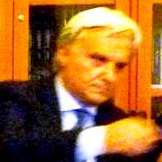As the first opera of the 2021-22 season, the Teatro dell'Opera di Roma presents, in co-production with Royal Opera House, a terrific staging of Leoš Janáček's Kátya Kabanová, which earned the director Richard Jones a Laurence Oliver Award for best new opera production in 2019.
Kátya Kabanová premiered in Brno in 1921, and this is the first time it has been performed in Rome, entrusted to the baton of David Robertson, with sets and costumes by Antony McDonald. Jones transposes Janáček's dark love story from the retrograde Russian merchant world of the early 20th century to a no less authoritarian and claustrophobic middle-class milieu in the 1950s. Small town hypocrisy and false moralism, a naive daydreamer, a tyrannical mother-in-law, adultery and suicide are the dreadful issues in this masterpiece, all preserved in Jones' dramatisation.
The setting works superbly in its bare minimalism. Nonetheless, Jones pays great attention to the psychological nuances, fully fulfilling the complexity of the tragedy. The story unfolds in a degraded environment, on a bare stage, with movements designed with accuracy to the millimetre. We perceive the social conflicts of an authoritarian world and the inner dramas of the protagonist up to the final tragedy when Kátya's innocent dreams of freedom, of flying like the birds, her desire for true love and authentic happiness are drowned in the Volga. The staging builds the inevitability of the drama with striking intensity, up to the tragedy of a small town wife as victim of ancestral matriarchy. All the protagonists are outstanding singers, but also awesome actors, and they sing in Czech as if it were their native language.
In the title role, American soprano Corinne Winters was outstanding, switching from depression to love, from lust to humiliation. She presented an endearing and touching character and sang and acted superbly and, despite her minute figure, her stage presence grew as the drama developed. Her voice was quite firm in the recitatives, complying with the Czech language speech rhythms. She also showed her clear, beautiful sound in the lyrical moments, which are very rare in this opera.
Her authoritarian mother-in-law, the Kabanicha, was performed with striking energy by Susan Bickley, a charismatic actress who used her mezzo with marked strength to accentuate the cruelty of her character. When at the end, after Kátya’s suicide, the Kabanicha sends away the people who have come to mourn, there was something mesmerising in her not-so-hidden pleasure.
Carolyn Sproule was a great Varvara, Kátya's foster sister, who prompts her to fulfil her wishes. She is the only positive and joyful character, giving cheerfulness to the work, counting on a warm lower and middle register. Varvara's lover, Kudrjaš, was sung by Sam Furness with a round timbre and a strong, confident middle range. Boris, Kátya's lover, was Charles Workman, who demonstrated a clear full tenor voice, especially in the top notes. Julian Hubbard as Tichon gave a good vocal portrayal of Kátya’s semi-alcoholic husband, totally submissive to his despotic mother. Another noteworthy performance was Stephen Richardson as Dikój, Boris' arrogant uncle, his firm bass showing masterly technique.
With tense and sound conducting, David Robertson was completely in control of the score, giving cohesion to the fragmented texture of Janacek’s masterpiece, which hints at folkloric Moravian elements. When it came to the clash between tuneful moments and the score's irregular rhythms, Robertson was able to make the music flow, not hiding its slightest lyrical nuances. Under his baton, the Opera di Roma orchestra was perfect, as was the collaboration between pit and stage.




